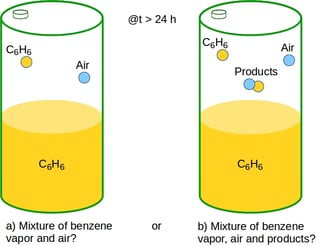If we would have benzene in a closed barrel for quite a while at room temperature, some vapor would form fast due to its volatility, right? But let's say that when the barrel was closed, some air got trapped inside. So it's inside at any time. Is there any chance that the benzene would react with the components in the air at room temperature? Or would we simply have benzene vapor and air? Or would we have benzene, some products of reaction and air? I made a sketch for a better understanding of my question.
So which one is the real one? And if it is the second one, would the reaction be similar to combustion, or?Is temperature a major player in this? And if so, how strongly would it affect the reaction?

